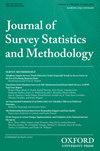自适应聚类抽样在非正式企业调查中的应用
IF 1.6
4区 数学
Q2 SOCIAL SCIENCES, MATHEMATICAL METHODS
引用次数: 0
摘要
非正式的商业活动在世界各地无处不在,但它几乎总是不被管理数据、注册表或商业来源所捕获。因此,很少有足够的抽样框架可供希望衡量该部门的活动和特征的调查执行者使用。本文将一种成熟的针对罕见和/或群集人口的抽样方法——自适应群集抽样(ACS)——应用于一种新的非正式企业群体。总的来说,与简单随机抽样(SRS)相比,应用ACS的效率提高很大,特别是在较高水平的现场工作中。特别是,在较高的初始起始样本值下,ACS效率比SRS的收益仍然相当可观,但膨胀阈值相对较高,这可能会减少现场工作的工作量。本文章由计算机程序翻译,如有差异,请以英文原文为准。
An Application of Adaptive Cluster Sampling to Surveying Informal Businesses
Abstract Informal business activity is ubiquitous around the world, but it is nearly always uncaptured by administrative data, registries, or commercial sources. For this reason, there are rarely adequate sampling frames available for survey implementers wishing to measure the activity and characteristics of the sector. This article applies a well-established sampling method for rare and/or clustered populations, Adaptive Cluster Sampling (ACS), to a novel population of informal businesses. Generally, it shows that efficiency gains through the application of ACS, when compared to Simple Random Sampling (SRS), are large, particularly at higher levels of fieldwork effort. In particular, ACS efficiency gains over SRS remain sizable at higher values of initial starting samples, but with comparatively high expansion thresholds, which can reduce the fieldwork effort.
求助全文
通过发布文献求助,成功后即可免费获取论文全文。
去求助
来源期刊
CiteScore
4.30
自引率
9.50%
发文量
40
期刊介绍:
The Journal of Survey Statistics and Methodology, sponsored by AAPOR and the American Statistical Association, began publishing in 2013. Its objective is to publish cutting edge scholarly articles on statistical and methodological issues for sample surveys, censuses, administrative record systems, and other related data. It aims to be the flagship journal for research on survey statistics and methodology. Topics of interest include survey sample design, statistical inference, nonresponse, measurement error, the effects of modes of data collection, paradata and responsive survey design, combining data from multiple sources, record linkage, disclosure limitation, and other issues in survey statistics and methodology. The journal publishes both theoretical and applied papers, provided the theory is motivated by an important applied problem and the applied papers report on research that contributes generalizable knowledge to the field. Review papers are also welcomed. Papers on a broad range of surveys are encouraged, including (but not limited to) surveys concerning business, economics, marketing research, social science, environment, epidemiology, biostatistics and official statistics. The journal has three sections. The Survey Statistics section presents papers on innovative sampling procedures, imputation, weighting, measures of uncertainty, small area inference, new methods of analysis, and other statistical issues related to surveys. The Survey Methodology section presents papers that focus on methodological research, including methodological experiments, methods of data collection and use of paradata. The Applications section contains papers involving innovative applications of methods and providing practical contributions and guidance, and/or significant new findings.

 求助内容:
求助内容: 应助结果提醒方式:
应助结果提醒方式:


